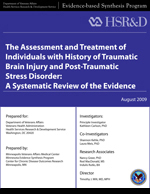
|
Investigators: Kathleen Carlson, PhD; Co-Investigators: Shannon Kehle, PhD and Laura Meis, PhD. Research Associates: Nancy Greer, PhD, Rod MacDonald, MS, and Indulis Rutks, BA. Director: Timothy J Wilt, MD, MPH.
Washington (DC): Department of Veterans Affairs; August 2009. |
Download PDF: Complete Report, Executive Summary, Report, Appendices
VA and Department of Defense (DoD) healthcare facilities are increasingly serving a large population of OEF/OIF veterans who have sustained traumatic brain injury (TBI), suffer from post-traumatic stress disorder (PTSD), or have both a history of TBI and current PTSD. Mild TBI (mTBI) is considered the most common form of TBI. Uncertainty exists regarding the long-term health outcomes of mTBI as well as the validity of criteria used to assess for a history of this injury. Current evidence-based practices to screen, diagnose, prospectively evaluate, and treat mTBI symptoms or PTSD may be less accurate or effective when these conditions co-occur. Thus, there is a need to develop an evidence base to identify best practices to define, diagnose, evaluate, and manage patients with mTBI/PTSD, particularly in U.S. veterans of OEF/OIF.
The systematic literature review addressed the following key questions: